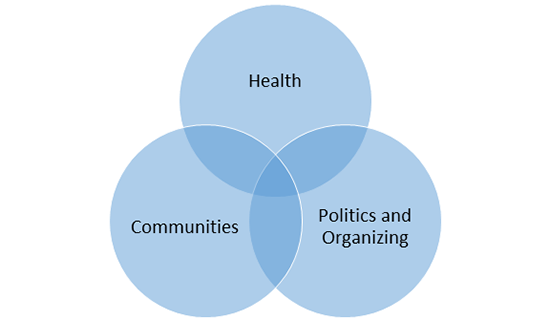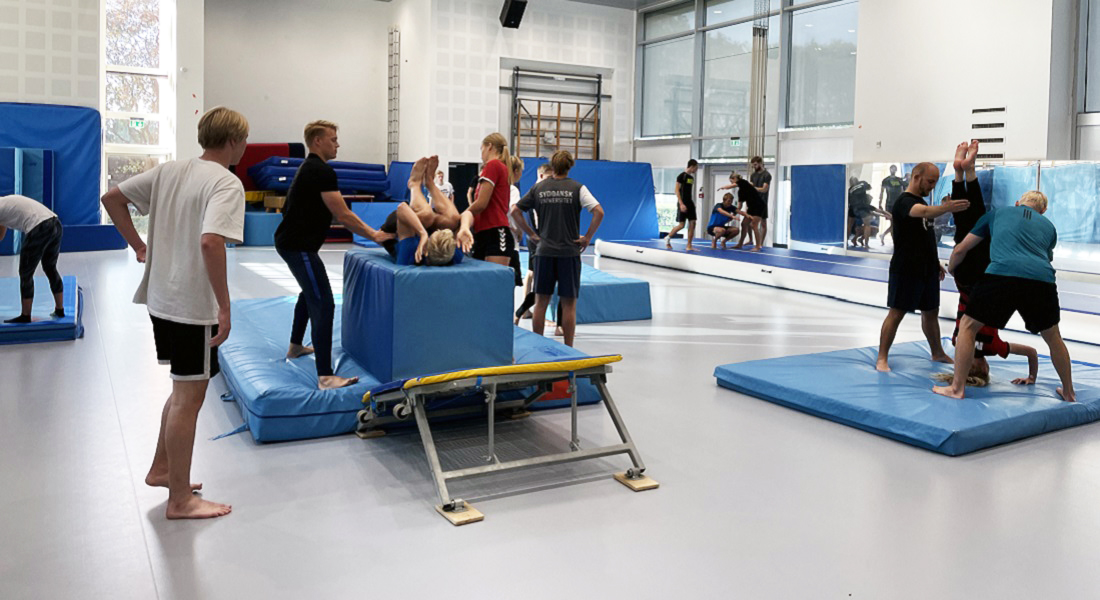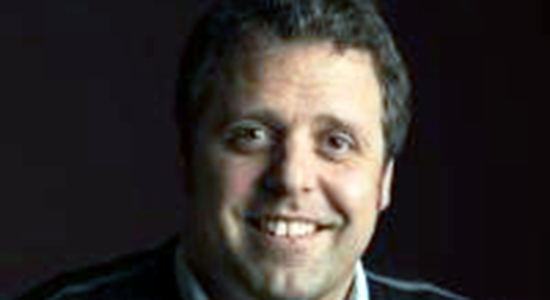Sociological Research in Sport and Exercise (SoRSE)
Research focus
Through this we strive to contribute to an international research community and to make a difference in everyday life.
We aim to support Danish municipalities, sport organizations and voluntary actors in the field, as well as political decision makers, with knowledge about how welfare society changes and develops in terms of sport and exercise.
We seek to facilitate that these actors can relate actively to changes so that improvements are made for as many people as possible.
With regard to issues related to sport and physical activity, sociology has the potential to deliver answers and insights that are empirically anchored in qualitative and quantitative studies and are guided by a solid, thorough theoretical anchorage that enables critical reflection at a level beyond that of everyday observation.
Our research themes can largely be summarized within three overlapping main areas:

- Health
- Communities
- Politics and Organizing
Health
How health can be linked to sport and movement, for instance by focusing on potentials, possibilities, and limitations for specific populations such as menopausal women, high school or vocational students, or elderly no longer active in the labour market.
How health can be linked to sport and movement in a historical perspective.
Communities
How existing associational or educational communities, or new digital communities linked to sport and movement, can be developed in order to ensure integration and democratic processes.
How working life and new digital media can be taken into consideration as communities where sport and movement can be developed and practiced.
Politics and Organizing
How politics has, from a historical perspective, influenced and used sport and exercise, whether through hosting major international sports events promoted through mass media, or most recently through the creation of partnerships between public and private organizations.
How physical activities are organized, for instance as gymnastics in education environments or in newer arenas such as workplaces.
Vision
With sociology as the disciplinary foundation of SoRSE, our vision is to deliver research at the highest international level within the sociology of sport, and to simultaneously contribute to related fields such as organization studies, the history of sport, policy/politics and implementation, leisure studies, public health, educational research as well as to the sociological core discipline.
Our hope is that this new knowledge can be applied to foster improvements for as many as possible of the people who are active in the world of sport and exercise on a regular basis. We wish to relate historical-sociological studies to a focus on development through innovation and knowledge about sustainability in the context of sport and exercise.
Mission
It is our mission that the research group – through collaboration, ideation and by extending existing individual contributions – creates an integrated, dynamic and focused forum where the group's participants can gather for supervision and professional development, where good ideas can be fostered, and where younger researchers feel welcome.
To realize our vision SoRSE collaborates with practitioners and with other national and international research environments. Collaborations are characterized by a vision to engage in research processes through innovation, dialogue orientation, and co-creation with our external relations.
The goal is to remain a benchmark unit for sociological sport and exercise research in Denmark, and a central actor in the international research community.
SoRSE has a number of objectives that are dynamic indicators for our current orientation:
- SoRSE is anchored and developed at the AB building at the Department of Nutrition, Exercise and Sports (NEXS), contributing to the maintenance, strengthening and expansion of the Section Sport, Individual and Society at the University of Copenhagen.
- SoRSE continuously clarifies where and how synergy and collaborations within the group can be created in order to reach higher levels of publishing and attracting external funding through joint efforts.
- SoRSE prioritizes interaction, integration, and mutual supervision, as well as input from external researchers and practitioners, through frequent meeting activities.
- SoRSE decides - taking the heterogeneity of the group into consideration - which national and, in particular, international research fora in which to make itself visible.
- SoRSE clarifies how the work of the group is organized in the best possible way so that a balance exists between workload (e.g. teaching) and time available for attaining merit through publishing.
- SoRSE continuously reviews with who and to what extent it collaborates with other relevant units such as Centre for Team Sports and Health, sociology of sport research environments at other universities, and practitioners in sport (e.g. the Danish Sport Confederation, Danish Football Association, Team Denmark, Danish Association for Sport and Gymnastics, Danish Company Sport etc.)
Research projects
The research project Women in Healthy Transition focuses on several different physiological and sociological aspects before, during and after women's menopause in relation to physical activity.
This research project will create important new knowledge about physiological and sociological changes through the menopause, which will have great scientific relevance as well as relevance for all women who, despite individual differences, sooner or later will encounter this transition in life.
Led by Associate Professor Lasse Gliemann from the August Krogh Section for Human physiology and Associate Professor Maria Hybholt from the Section of Social Medicine, Department of Public Health, SUND, the research project combines physiological and sociological studies in a long-term perspective in completely new ways.
Overall, the project follows 200 middle-aged Danish women from before they enter menopause and in the years after. Over five years, the researchers will investigate the function of the women's heart, brain, blood vessels and blood.
In addition, the influence of menopausal changes and physical activity on the women’s self-identity and experience of their body will be elucidated via focus groups, interviews, and questionnaires.
The project group expect to carry out follow-up studies 10 and 20 years in the future on the same population to ensure a thorough knowledge of the long-term effects of menopause and the relation with physical activity.
The results from the project will be of decisive importance for the understanding of the menopausal changes before, during and after the final menstruation period in relation to physical activity.
Implementation of collaboration and bridge-building between municipalities and voluntary sports associations.
The project investigates how sports associations and volunteers collaborate with municipalities to create inclusive and engaging communities for new target groups.
About the project
SUND BRO IF will create knowledge about how municipalities and sports associations collaborate to develop and implement inclusive sports communities for adult target groups within the association context.
SUND BRO IF is a sports sociological PhD project led by Signe Engdal, with Laila Ottesen as supervisor.
The project is based on collaboration relationships with five selected municipalities across rural and urban areas and aims to examine the sports associations' perspectives on collaboration and analyze how sports associations include new adult target groups in their community.
The project will focus on analysing both existing and newly developed sports activities in sports associations targeted people who are unaccostumed with exercising in sports associations.
Through observations of sports associations and interviews with volunteers, board members, and municipal partners, the project will create knowledge about how collaboration between the public and voluntary sectors affects the inclusion of new, non-exercising adults in sports associations.
The project strategically selects specific sports associations and sports activities to work with as research in the field shows that team sports and activities have an impact on promoting social relationships and friendship among participants, which influences adults' continued participation in physical activity in a long-term perspective.
The project's results will have implications for how municipalities and sports associations understand the opportunities and limitations of collaboration and for including new target groups in association contexts. In a health perspective, it can be crucial for non-exercising adults' opportunities to continue with physical activity in everyday life, for example, after a period at a municipal institution, such as a health center, job center, or other.
Background
Physical activity and participation in social communities are both important factors for the Danish population's welfare and health. The vision of becoming the world's most active nation (Move for Life, 25-50-75) and an increased focus on applying sports as a health-promoting, disease-preventing, and treating element is part of the Danish sports and health policy context.
Among state agencies, municipalities, and sports organizations, there is a growing interest in collaborating and involving the sports arena in solving both health and employment-related issues in Danish society. "Exercise and Community on Prescription" as a project pool at the Danish Agency for Labor and Recruitment (STAR) examplifies attempts to address these challenges, and nine municipalities have examined and tested how they can develop sustainable collaboration models with local sports associations.
Likewise, 32 municipalities under the Move for Life vision have implemented new sports activities and adapted existing sports activities to target groups that are not used to exercising in the hope of getting more active Danes by the end of 2025.
It is in projects such as those mentioned above that SUND BRO IF will analyze different existing collaboration and bridging models between municipal institutions and sports associations. Implementation of collaboration has been previously studied in municipalities, but in-depth knowledge about the organization of collaboration in civil society.
Therefore, the project will examine mechanisms that enable and restrict the implementation of collaboration and integration of new members into the various associations' communities over a longer period.
Team sports and team activities will be at the center of the project since research from the Center for Team Sports and Health shows the importance of community-building and enjoyable activities for adults' desire to continue participating in physical activity.
Research
Mapping of formalized forms of collaboration
At present, there are several versions of formalized collaborations between municipalities, sports organizations, and sports associations. Through document analysis, including municipality agreements, Exercise and Community on Prescription agreements, and other collaboration agreements between municipalities and sports associations, the project will create knowledge about the structural frameworks and conditions for collaboration relationships.
Observational studies at sports associations
Fieldwork carried out over an extended period using participant observation will provide in-depth insight into the associations' social practices and their work to include new participants in the community both in practice and at a structural, overarching level in communication with the municipality and internal board meetings.
Results and dissemination
The project started in December 2020 and is expected to be completed by 2026.
Since the empirical fieldwork will span an extended period, results will only be available at the PhD defense, while ongoing results will be disseminated as scientific and non-scientific articles and reports.
The Center for Team Sports and Health will support communication and dissemination of results from scientific articles to relevant Danish media.
Funded by
Nordea Foundation's grant to the Center for Team Sports and Health.
Project period: December 2020 to 2026.
Contact
PhD student Signe Engdal
The aim of this project is to explore how gymnastics is taught in the BA programmes in PE at Danish universities, and how this connects to the practical reality of the students’ future work life – especially as high school teachers.
Central research questions
- How is gymnastics taught in the BA programmes in PE at Danish universities and why?
- How does the curriculum connect to the practical reality of the students’ future work life – especially as high school teachers?

Gymnastics has historically played a large role in the development of PE in Denmark. Today gymnastics is still a central part of the national curriculum for PE in primary and lower secondary school, but in high school PE gymnastics is optional and can be included as part of the mandatory subject area “classical and new sports”.
At the four Danish universities that have a BA program in PE gymnastics is part of the mandatory curriculum, but the emphasis on it differs. There is no universal definition of gymnastics, but the focus of this study lies mainly on apparatus work.
The aim of the project is to explore how gymnastics is taught in the BA programmes in PE at Danish universities and why, as well as how the curriculum connects to the practical reality of the students’ future work life – especially as high school teachers.
The analysis applies a combined sociological and pedagogical perspective, drawing theoretical inspiration from, among others, Norbert Elias. Qualitative methods are used for data collection in this project (i.e. interviews, observations, and document analysis).
This project will contribute with specific knowledge about
- the gymnastics curriculum in the BA programmes in PE,
- the connection between theory and practice in PE,
- research based teaching in practical courses in BA programmes in PE, and
- the interplay between university education and labour market needs.
The project started in October 2020 and is expected to be completed in late 2025.
When articles related to the project are published, they will be featured on this page.
Contact
Andorra Lynn Jensen
PhD student
To explore physical activity experiences of individuals with spinal cord injury throughout the life course.
The purpose of this programme of research is to explore the experiences of injured rugby players in the physical activity interventions provided by the RFU Injured Players Foundation (IPF) and evaluate the influence of these activities on the health and well-being of injured players over time.
With an increasing number of younger people sustaining SCI living longer, there is an urgent need to understand the unique needs of those ageing with SCI and the role of physical activities on quality of life throughout the life course.
Funded by
Contact
PhD student Laura Wilcock
Advancements and new technologies
In this project are we defines the state-of-the-art of psychological and behavioural metrics in sport psychology (from laypeople to elite levels), and we explore the roles and opportunities of new technologies in the advancements of measuring psychological and behavioural markers in sport psychology (smartphones, wearable devices, ecological momentary assessment, etc.)
This is a double-degree PhD project is carried in collaboration between Department of Nutrition Exercise and Sports, University of Copenhagen, Denmark and Department of Human Sciences, University of Verona, Italy.
Contact
PhD student Michael John Dwyer
Members of research group
| Name | Title | Phone | |
|---|---|---|---|
| Adam B. Evans | Associate Professor | +4535331336 | |
| Andorra Lynn Jensen | PhD Student | +4535322429 | |
| Laila Ottesen | Associate Professor | +4535321741 | |
| Signe Engdal | PhD Fellow | +4535336232 | |
| Ulrik Wagner | Associate Professor, Head of Section | +4535321511 |
Publication list for
Associate Professor Ulrik Wagner
Associate Professor Laila Ottesen
Associate Professor Adam B. Evans
Research Consultant Marie Birch Overbye
PhD student Andorra Lynn Jensen
PhD student Signe Engdal

